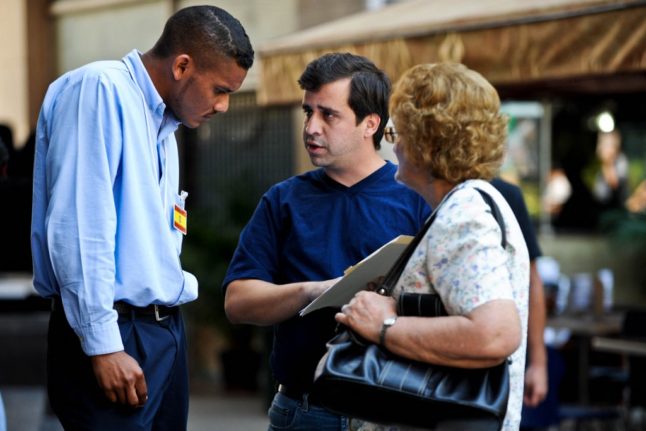Spain’s non-lucrative visa – visado de residencia no lucrativa – allows non-working individuals with a reliable source of income or substantial savings to live in the country for more than three months and is valid for one year.
The visa, which is also referred to as the non-working residence visa at some consulates, could be for those who want to retire in Spain, those who receive a passive income from their home country or simply those who want to spend a year living in Spain and have ample savings to do so.
For 2023, applicants need to prove that they have 400 percent of the annual IPREM (Indicador Público de Renta de Efectos Múltiples).
In 2023 the annual IPREM is €7,200, so four times this amount is a total of €28,800.
For every family member included in the residency application, it’s an extra 100 percent of the IPREM, which is an extra €7,200 for the year.
This means that a couple will need to prove savings or passive income of €36,000.
READ MORE:
- How much money do Americans need to get Spain’s NLV in 2023?
- How much money do Brits need to get Spain’s NLV in 2023?
In recent years, many applicants have been confused about the exact nature of the non-lucrative visa, using it to live in Spain, but to continue working remotely for companies abroad. This in fact isn’t allowed as you are still earning money and working in Spain, even though it’s for a foreign company. Many consulates are cracking down on this, meticulously checking that you’re not still receiving funds for working.
But what exactly counts as proof of income and what can you show to the consulate to show how much you have?
This is where it starts to get tricky because, in fact, different Spanish consulates around the world define savings and assets slightly differently and are asking for different methods of proof.
Spanish Consulate in London
The Spanish Consulate in London states that applicants for the non-lucrative visa need to have:
“Financial means required to cover the living expenses and, where appropriate, those of their family members, for one year…The availability of sufficient financial means will be evidenced by the submission of original and stamped documents that verify the perception of a periodic and sufficient income or the holding of an estate that guarantees the perception of that income. If the financial means come from shares or participations in Spanish companies, mixed or foreign companies, based in Spain, applicants shall prove, by certification thereof, that they don’t carry out any work activity in such companies and will submit an affidavit to that effect”.
This means that the consulate will accept passive income as well as savings, such as rent from a property or dividends from a company, as long as you’re not actually working for that company. Proof could include documents such as bank statements and contracts.
Spanish Consulate in New York, US
The Spanish Consulate in New York states:
“The applicant must submit the originals and a copy of the documents proving that they have sufficient financial means to cover the expenses of residing in Spain for the initial year of the residence permit, or accrediting that they have a regular source of income, for themselves and, where applicable, for the family members accompanying them… Foreign documents must be legalised or apostilled and, where applicable, must be submitted together with an official translation into Spanish.”
While the wording is slightly different from the Spanish Consulate in London, they also state that they will accept proof of a regular source of income, so again in theory they will accept income from passive sources such as rental income.
Spanish Consulate in Sydney, Australia
The Spanish Consulate in Sydney, Australia uses the same wording as the consulate in New York.
Spanish Consulate in Toronto, Canada
The Spanish Consulate in Toronto, Canada is far more specific about what type of proof and types of passive income it will and won’t accept. It states that applicants need:
“Three most recent bank statements. Bank statements from other countries must be legalised. Investments will be considered a supporting document. You must have the total quantity when you apply for the visa. The applicant must submit the originals and a copy of the documents proving that they have sufficient financial means to cover the expenses of residing in Spain for the initial year of the residence permit, or accrediting that they have a regular source of income, for themselves and, where applicable, for the family members accompanying them.”
READ ALSO: Non-lucrative vs digital nomad visa – Which one should you choose to move to Spain?
What the experts say
Immigration lawyers at the international relocation company Where Can I Live suggest that you should prove that you have slightly more than the required amount because “Applying with the exact amount does raise questions”.
For example, if the required amount for you and your partner is €34,741, they suggest that you actually prove that you have €35,000 instead, to act as a financial buffer. They also suggest you have a financial buffer for each family member on your application, showing you have more than the required amount each time.
They say that “savings can be in a bank account in your home country. But, for some nationalities, including China and Russia, the funds should be deposited into a local Spanish bank account”.
Immigration lawyers at Balcells Group based in Barcelona say: “Many times the different Spanish consulates request a bank certificate of liquid money in your account. The exact date of the certificate must be as close as possible to the application day. Bear in mind that it will depend on the consulate, but the government will usually look at bank statements from the last six months”.
Legal experts at Immigration Spain say that there are two ways of proving income: “Either proving that you have sufficient means for the whole period beforehand (for example in a bank account) or by accrediting the existence of any type of source that periodically generates income, such as a pension or the rent of a house you own”.
They suggest that the proof can be in the form of “Bank statements, property deeds, certified checks or credit cards, as long as they are accompanied by a bank certification that accredits the amount available as credit on the card”.
READ ALSO: What are the pros and cons of Spain’s non-lucrative visa?
What the applicants say
In reality, applications can always play out a little differently, so we had a look at what type of proof real people were asked for when they applied for Spain’s non-lucrative visa. These experiences were published on the Spanish NVL Facebook group.
One person who applied through the San Francisco consulate said: “As long as you show the required amount over three months’ worth of statements, you can use your savings account. I used my combined checking and savings account + Roth IRA investment”.
Another person applying through the Manchester Consulate in the UK said: “We presented six months of bank statements. Translation of bank statements was not required – they do spend some time going through them looking at funds coming into the accounts and questioning where from. They are looking for evidence that you are still working which would be an automatic no no. As long as you have proof of funds then that is ok, that’s all they are interested in…. There is no request for any information about mortgages/credit card debt at your appointment so if you have those then just don’t refer to it in any of your paperwork. On the bank statements, they have to be stamped by the bank so a downloaded statement from online banking could get refused. We use Barclays and you can get a stamped print from a machine in the branch which was accepted”.
Another applicant in Chicago in the US said they needed: “Proof of adequate liquid financial resources and income: Bank statements from the last three months from all your bank accounts; social security benefits, private or public retirement benefit other (Army Veteran, Teachers’ unions, etc); proof of sufficient periodic income, including but not limited to: investments, annuities, sabbaticals and any other source of income, providing sufficient funds to live in Spain without working…. If you are not officially retired you cannot present your retirement plan (IRA, 401-K) as proof. You also need the last three years of complete TAX IRS returns”.



 Please whitelist us to continue reading.
Please whitelist us to continue reading.
Member comments